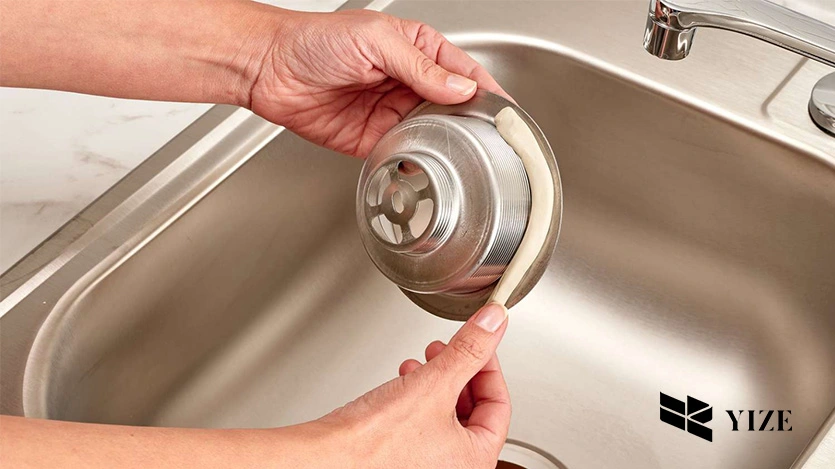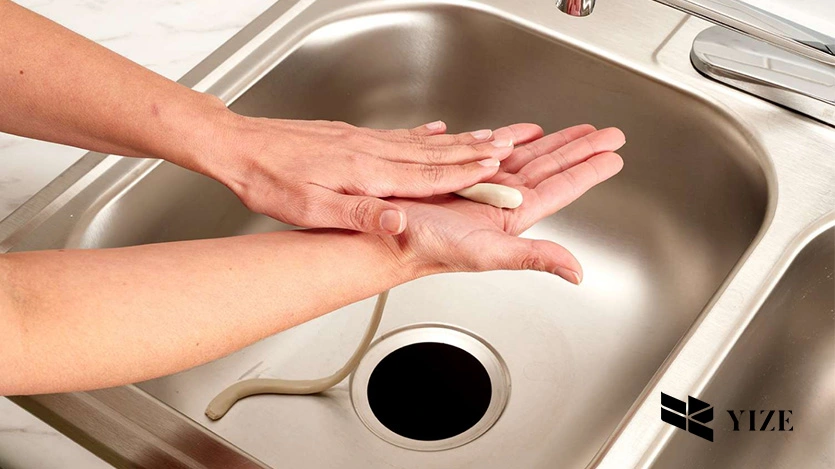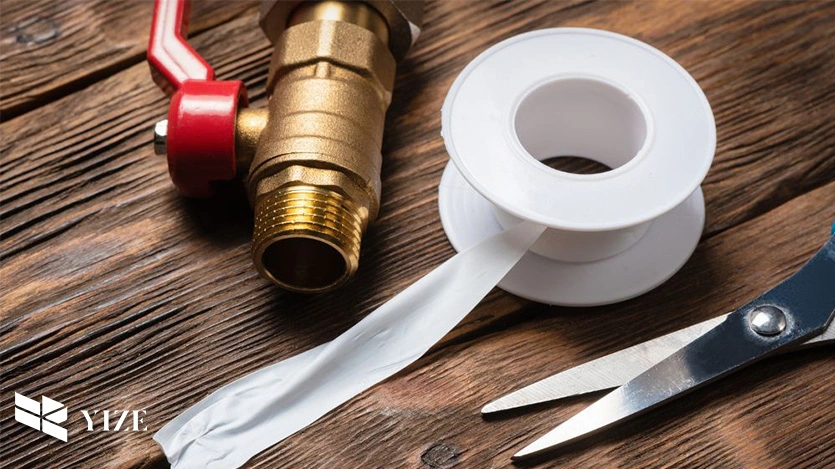
Introduction
Plumbers putty is a pliable sealing compound, which is used in plumbing to give a watertight seal around the sinks, faucet, or other plumbing fixtures. They are easy to use and have featured in most plumbing projects for quite some time. Nevertheless, there are some cases in which the use of plumbers putty is not advisable.
For example, it may not bond well to specific substrates or it may degrade and become brittle, causing leakage. Therefore, it is common to find people seeking more compatible, durable and sustainable alternatives to plumbers putty. It goes without saying that selecting the appropriate sealant for your plumbing projects is a critical decision that should not be taken lightly.
Section 1: Understanding the Need for Alternatives
It is important to note that while plumbers putty is helpful, it has its drawbacks. One major problem is that it does not adhere well to surfaces such as marble or granite. These materials can easily soak the oils from the putty hence causing discoloration and damage of the devices. Also, plumbers putty breaks down over time and loses its flexibility and ability to seal due to its exposed nature to air. This can cause leakage and therefore require some repairs.
However, in the contemporary world we require more reliable and multifunctional sealing systems. Different plumbing systems are made of different material and it is therefore important to have a sealant that is compatible with all of them. Environmental factors are also relevant in this case. Some individuals desire environmentally friendly and non-toxic sealants and coatings. Here are several modern alternatives to plumbers putty which are effective with todays advanced materials:
Section 2: What Can I Use Besides Plumbers Putty?
Below are some of the most recommended alternatives to plumbers putty that you can try out:These alternatives are expected to be more compatible, long lasting, and easier to use than their counterparts. When selecting the right alternative, one should have in mind the kind of material that they are working on, the nature of the seal they require, and the impact that the sealant will have on the environment.
Section 3: 5 Effective Alternatives to Plumbers Putty

There are other sealing materials that are more compatible and long-lasting than plumbers putty.
1. Silicone Caulk
Silicone caulk is a versatile, elastic material that forms from a silicone polymer. It is waterproof, flexible and can withstand effects of mold and mildew which makes it suitable for sealing around sinks, tubs and showers. It bonds well to different types of surfaces such as glass, metal, and ceramics. To use silicone caulk, first, ensure the area is clean, then cut the tip of the caulk tube at a 45-degree angle, and then apply the silicone smoothly in one movement. After smoothing it with a tool or soapy finger, allow it to cure. In its flexibility and durability, silicone caulk is superior to plumbers putty.
2. Epoxy Putty
Epoxy putty is a chemical compound that is formed from an epoxy resin and a hardener to create a strong adhesive bond. It seizes, clogs, and restores pipes; it is compatible with metals, plastics, wood, and ceramics. Combine it in a 1:1 ratio and spread over the affected area and then level it. It hardens in a few minutes and fully cures in several hours. While plumbers putty can be easily removed, epoxy putty cannot be removed once it has set, though it is more flexible.
3. Teflon Tape (PTFE Tape)
Teflon tape, also known as PTFE tape, is a thin, white plastic tape utilized in wrapping around threaded pipe threads. It seals and reduces joint expansion, waterproof, thermal and chemically shield against any liquid or solid substance. Turn it clockwise until it covers the male threads completely and screw the pipes together. Teflon tape is suitable for threaded applications while plumbers putty should be used on flat surfaces. It is less cumbersome and more convenient for use especially in small areas.
4. Thread Sealant (Pipe Dope)
Pipe compound, also known as thread sealant, is a liquid or paste that is applied on pipe threads to prevent leakage. Sometimes it can comprise Teflon or other lubricants, making a seal to threaded connections, avoiding leakage and ensuring easy assembly and dismantling. It is used on male threads and when the pipes are screwed, the sealant goes to the gaps. Plumbers putty is suitable for flat surfaces while for threaded connections, it is advisable to use thread sealant since it produces a stronger and longer lasting bond.
5. Butyl Tape
Butyl tape is a pliable sticky material made from butyl rubber that is used for sealing and waterproofing. It is highly adhesive, waterproof, and flexible; making it suitable for sealing horizontal, vertical, and angular joints, seams, and cracks where materials like metal, glass, and plastic are used. Remove any dirt and moisture on the surface, trim the tape, apply it, and release trapped air. However, butyl tape is flexible and more resilient compared to plumters putty and easier to apply in other aspects.
Section 4: What Do Plumbers Use to Seal a Sink Drain?
It is common that plumbers employ several types of sealants at the time when they install sink drains. Popular types include silicone caulk, epoxy putty, and Teflon tape. The type of sealant to be used will therefore depend on the type of sink and drain material to be sealed as well as the preferred type of sealant.
For instance, in a bathroom renovation project, a plumber may use silicone caulk to cover the area surrounding the sink and epoxy putty to fix a broken pipe. In another case, Teflon tape can be used to tighten threaded pipe connections especially while fitting a kitchen sink. There is never a one-size-fits-all solution; plumbers select the most appropriate sealant for the job from the available choices.
Section 5: What is the Best Sealant for a Bathroom Sink Drain?
While selecting the right sealant for a bathroom sink drain, look for qualities such as durability, water resistance, ease of application and compatibility with the sink. Applicable sealant should be able to offer a long-term protection and have ability to prevent water infiltration through the seam.
According to these parameters, silicone caulk is usually the most suitable for sealing bathroom sink drains. It is highly durable, water resistance, and has no tendency to support the formation of mold and mildew. Epoxy putty is another good one, as it is very strong and can be used for repairing hoses and pipes and make permanent joints. Teflon tape and thread sealant are also favorable due to their ability to seal the threaded connection and prevent leakage.
Section 6: Where to Buy Plumbers Putty and Alternatives
Plumbers putty and products like it can be purchased at most stores, including online stores and physical stores. Some of the famous online stores include Amazon, Home Depot, and Lowe’s. As for a specific recommendation, Kindly, YZDRAIN presents a range of plumbing sealants that you might be interested in.

When it comes to the cost difference, silicone caulk and Teflon tape appear to be cheaper products with the cost of a tube or roll ranging between $5 and $10. Epoxy putty and thread sealant can cost a little more, usually ranging from $10 to $20. Butyl tape costs between $10 to $20 depending on its length and width of the tape used.
Conclusion
Selecting the alternatives to plumbers putty is critical in determining the durability and effectiveness of the seal. However, apart from plumbers putty, there are several other options available which are more compatible, longer lasting and easier to use. Some of the best options include; silicone caulk, epoxy putty, Teflon tape, thread sealant, and butyl tape. Both have their strengths and weaknesses and should be chosen based on what is required in your particular circumstance.
Frequently Asked Questions (FAQs)
What can be used instead of plumbers putty?
Others are silicone caulk, epoxy putty, Teflon tape, thread sealant and butyl tape.
Is it possible to replace plumbers putty with silicone caulk?
Yes, silicone caulk is waterproof and flexible and it does not develop mold which makes it a good substitute.
Is epoxy putty superior to plumbers putty?
Epoxy putty also forms a stronger bond and there is no problem of the substances drying off or developing cracks.
